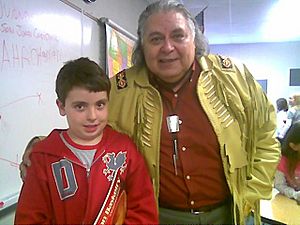Paul Apodaca facts for kids
Paul Apodaca was born in Los Angeles, California. He is a respected professor of Anthropology and American Studies at Chapman University. He has taught many students about different cultures and histories.
Contents
About Paul Apodaca
Paul Apodaca grew up in Tustin, California. His family has deep roots in Native American culture. His father's family comes from the Navajo Nation. They are part of the Ma'ii deeshgiishinii Clan. His mother's family is Mixton.
He studied at the University of California, Los Angeles. He earned two advanced degrees there. One was in American Indian studies. The other was in Folklore and Mythology. In 1996, he was named the Outstanding Graduate Student. Today, Paul Apodaca lives in Orange, California.
Paul Apodaca's Career
Teaching and Research
Paul Apodaca is a professor at Chapman University. He also teaches at UCLA. He has worked as an advisor for the Smithsonian Institution. This included helping the National Museum of the American Indian. He represented California, Nevada, and Utah.
For 17 years, Apodaca was a curator at the Bowers Museum. This museum is in Orange County. In 2008, he gave talks at the Southwest Museum of the American Indian. He spoke about topics like the Mayan calendar and ancient California tools. He also discussed how American Indians are shown in movies.
In 2008, he was a main speaker at a conference for Native American professionals. This event was held at the University of California.
Preserving Native American Culture
Paul Apodaca helped save old recordings. These recordings featured traditional songs. They were sung by Agua Caliente tribal leaders. The songs tell stories from Cahuilla oral history. These recordings are now kept safe at the Agua Caliente Cultural Museum. It is located in Palm Springs.
Cultural Advisor Work
Apodaca helped choose films for the NMAI Native American Film and Video Festival. He has also been part of the Native California Network. He served on the board for the California Council for the Humanities. He has worked with many arts and cultural groups.
He advised places like Knott's Berry Farm and the Walt Disney Company. He helped them understand Indian culture. He was also an advisor for the TV mini-series, Lonesome Dove (1989).
Helping with Disney Films
Paul Apodaca was a creative consultant for the Disney film, Planes: Fire and Rescue (2004). He helped create the character Windlifter. Windlifter is a helicopter shown as an American Indian. Apodaca helped with Windlifter's look. He also helped with a story part where Windlifter shares a Native American folktale. This tale was about a coyote being renewed by fire.
Apodaca also helped make an 8,000-year-old bear carving an official California State Prehistoric Artifact. He worked with Henry Koerper and Jon Erikson on this.
Editorial Work
Apodaca was an editor for News from Native California. He also edited the Journal of California and Great Basin Anthropology. He has advised publishers like Pearson Scott Foresman. He is on the editorial board of Malki Museum Press.
Performing Arts
In 2009, Paul Apodaca performed with The Dave Brubeck Quartet. This was during the Brubeck Festival. It celebrated 50 years of Brubeck's album, Time Out.
He also appeared in a special feature for the DVD of the film, Knowing (2009). In it, he talked about myths of the end of the world.
Apodaca performed music for the film, Broken Rainbow (1986). This documentary helped stop the forced movement of many Navajos in Arizona.
Awards and Honors
- Orange County Human Rights Award 1971
- Native American Journalists Association award 1997 (for his article on language revival)
- Mary Smith Lockwood National Medal for Education 1999 (from the Daughters of the American Revolution)
- Little Eagle Free Foundation Man of the Year 2007 (sponsored by the family of Walter Knott)
- Honorary Host Committee member (UCLA 40 Years of Ethnic Studies celebration)
- Smithsonian Institution Museum Professional Award
 | Leon Lynch |
 | Milton P. Webster |
 | Ferdinand Smith |


